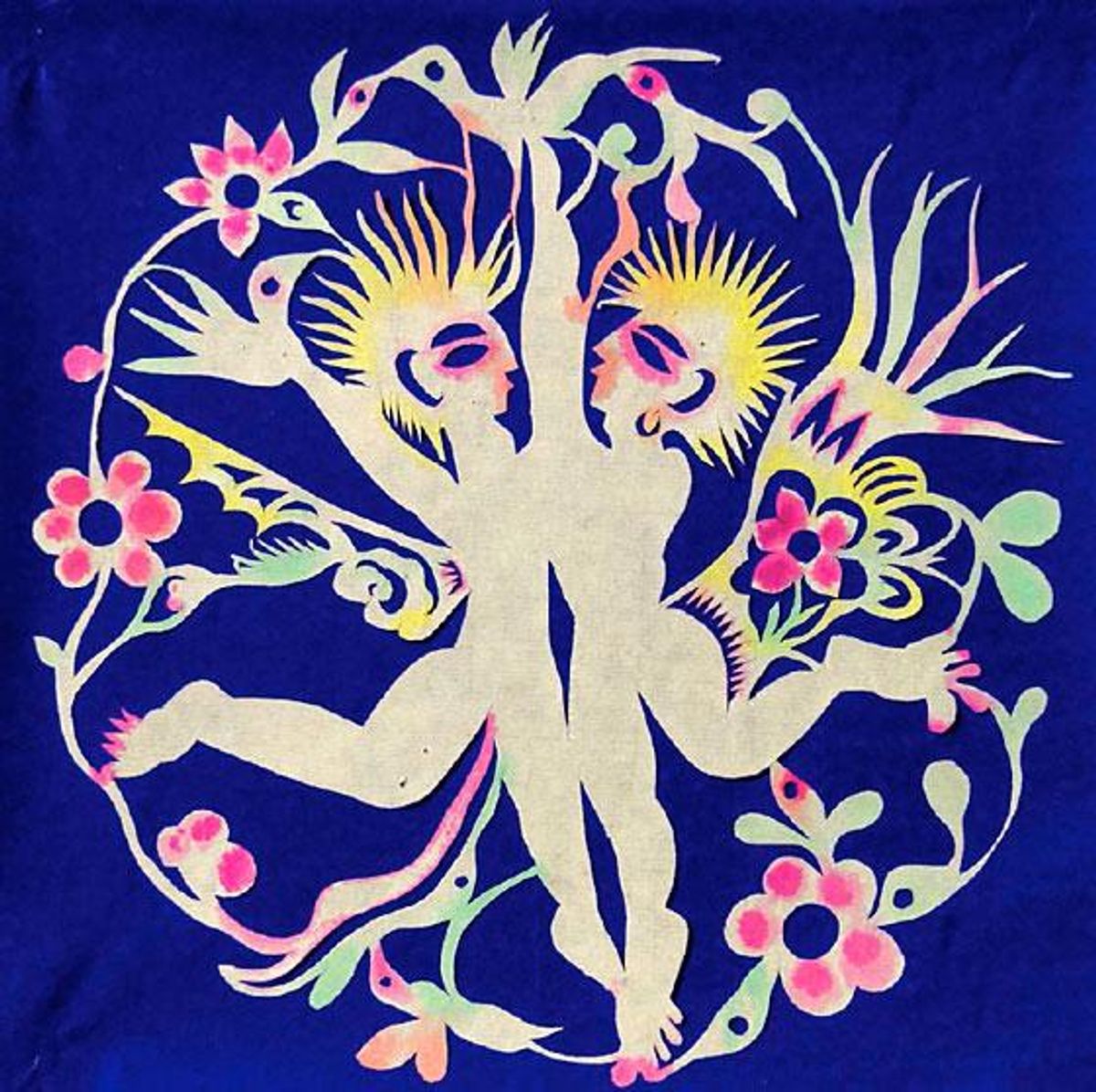The sweet innocence of Xiyadie's renderings in paper and tints camouflages the sexual content in his work. His cuttings are lighthearted and joyous yet intense and revolutionary, considering current conditions for artists, especially LGBT ones in China. How dare he portray such delightful images of same sex love?
Xiyadie (pronounced Zhee-ya-dee) was born August 27, 1963 in Shanxi Province, China, known as the cradle of many Chinese folk arts, including the art of paper cutting. A gay, married father living in Beijing, he has a 23 year-old with cerebral palsy and a 21 year-old daughter, currently a college junior.
A working farmer who calls himself the "Siberian Butterfly," Xiyadie's own formal schooling ended after middle school. His work is publicly prohibited in China, where the LGBT community continues to deal with freedom of expression issues and censorship.
Xiyadie's life experiences have inspired his work. "[My inspiration] links my curiosity of every aspect of nature and calls to me when I close my eyes to imagine during the day, and the illusions I experience in the quiet night's thousands of dreams," the artist says.
Previously unknown to U.S. art audiences, Xiyadie was discovered during a cultural mission between The Center Long Beach in Southern California and the Beijing LGBT Center earlier last year. This world premiere of his work in a public gallery, the exhibition will be presented April 29 through July 14, 2012 at alternative fine arts gallery Flazh!Alley Art Studio in San Pedro, California. The exhibit, titled "Metamorphosis of a Butterfly: A Kaleidoscope Vision of Life by a Gay Chinese Artist," consists of more than 50 works celebrating same-sex love and life's struggles and transcending the harsh discrimination and social stigma facing the LGBT community in China today. The Center Long Beach will host an artist lecture and discussion as part of its QSpeak Series on May 10, 7 - 8:30 p.m.
Note: Some of the artwork is more explicit than the samples here, for that reason the exhibit is restricted to those 18 and over only.
The Advocate: Why are you an artist?
Xiyadie: I've been exposed to an artistic environment since childhood. My grandfather does landscaping and sculpting. My mother is a clever paper cutter and makes Hua-mo (a Chinese folk art form, that makes figures out of buns). The paper cutting that the old bounded-foot women in my village do was so fascinating that I eventually fell in love with it. Paper cutting is my own spiritual world. It is my world. In [that world] there are no worries and sorrows, only peace and free imagination. I never thought about becoming an artist. Some people saw my work and then called me one. I'm only a farmer, belonging to my yellow soil land.
What catches your eye?
Everything. Truth. Goodness. Beauty. Ugliness. Sometimes it's not about what you see, but rather what you can't forget.
Tell us about your process or techniques?
Whenever a good inspiration hits me, I cut it out using the traditional Chinese paper cutting techniques. I observe the patterns constantly during the whole process and work with the nature of my paper. I give and take boldly. In the days that I'm not feeling inspired, I just sleep [sic] till the day's end. I would tear up any works that are unsatisfactory, anyway.
What materials do you use?
I use a lot of materials. Banner papers, traditional Chinese rice papers, craft papers, newspapers, copy papers, cloth and silk. Everything that splits under a pair of scissor blades, I try to cut. Sometimes I imagine cutting the vault of the night's black sky into a flaming sun. Sometimes people like to fight with nature. Sometimes you have to work with it.
How long does it take you to complete a typical piece?
I don't think there's an average time. Big works can take me as long as 7 months and small ones for half an hour to hours. It depends a lot on my mood and whether I'm feeling inspired.
How do you describe your work?
Straightforward. The simplest folk art paper cutting is to make people understand at first sight. I use fixed folk symbols such as flowers to help me speak out.
What makes good artwork to you?
When I see the way the work appears to be and feel so delighted that I could dance and kiss it.
What is important and meaningful about bringing your work to the United States?
I think of my work as a pot of tea I make and I'd like to enjoy it together with my friends in the United States.
How has it been collaborating with your U.S. sponsors? (The Center Long Beach and Flazh!Alley Art Studio?)
I just want to fly over there and give my friends at the Long Beach Center and Flazh!Alley Art Studio a long, big hug. May our hearts be close to each others!



















































































